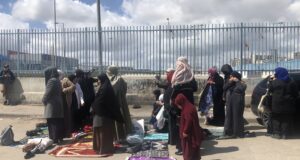18 December 2009
For immediate release:
A peaceful demonstration of around 300 people, held in solidarity with the evicted Palestinian residents of Sheikh Jarrah neighbourhood in East Jerusalem, was violently dispersed by the Israeli police.

Photo by: Oren Ziv / Activestills.org
Following a violent dispersal of a similar demonstration last week, the police was blocking the roads in Sheikh Jarrah from the early afternoon, in an attempt to prevent protesters from reaching the Palestinian neighbourhood. They set up barriers at the entrance to the area and, before the demonstration even started, arrested an American activist, who was sitting in the back yard of the al-Kurd house, talking to the family.

Later on, twenty six Israeli protesters were arrested, three of them wearing clown costumes. Similarly to last week, the police used a section of the al-Kurd house, currently occupied by settlers, to detain the arrested demonstrators.
Demonstrators reported harsh violence committed by the police during the arrests. Assaf Sharon, one of the protesters, said: “This event represents a legitimate and non-violent protest of Palestinian, international and Israeli activists, against the ongoing campaign of evicting Palestinian families from their homes in Sheikh Jarrah, only for these to be taken over by extremist settlers. The police has been brutally dispersing these peaceful protests for the second week, while the Palestinian families live in constant fear of violent settler attacks.”
Last week, the police arrested 24 demonstrators, including 3 international activists. The arrestees reported ill-treatment by the police, who subjected them to several strip-searches, denied them food and water for prolonged periods of time and held them outside of the police station until late at night, with insufficient protection against the cold conditions. Israeli activists received a condition not allowing them to enter Sheikh Jarrah for 30 days from the judge, while the 3 foreign nationals were released only to be illegally arrested again and taken straight from the courtroom to a deportation facility. They were released early in the morning on Sunday, more than 40 hours after their initial arrest.
The actions of the police, followed by the court decisions, preventing activists from returning to the Palestinian neighbourhood for 30 days, shows their determination to discourage the growing protests against settler take-overs of Palestinian houses in East Jerusalem.

Palestinian men praying outside of the al-Kurd house, occupied by settlers
The Palestinians in Sheikh Jarrah have been suffering from violent attacks on the part of settlers who invaded their houses in recent months. Four Palestinian houses have been taken over since November 2008, displacing around 60 persons.
Background
Approximately 475 Palestinian residents living in the Karm Al-Ja’ouni neighborhood of Sheikh Jarrah, located directly north of the Old City, face imminent eviction from their homes in the manner of the Hannoun and Gawi families, and the al-Kurd family before them. All 28 families are refugees from 1948, mostly from West Jerusalem and Haifa, whose houses in Sheikh Jarrah were built and given to them through a joint project between the United Nations Relief and Works Agency (UNRWA) and the Jordanian government in 1956.
So far, settlers took over houses of four Palestinian families, displacing around 60 residents, including 20 children. At present, settlers occupy all these houses and the whole area is patrolled by armed private security 24 hours a day. The evicted Palestinian families, some of whom have been left without suitable alternative accommodation since August, continue to protest against the unlawful eviction from the sidewalk across the street from their homes, facing regular violent attacks from the settlers and harassment from the police.
The Gawi family, for example, had their only shelter, a small tent built near their house, destroyed by the police and all their belongings stolen five times. In addition, the al-Kurd family has been forced to live in an extremely difficult situation, sharing the entrance gate and the backyard of their house with extremist settlers, who occupied a part of the al-Kurd home in December 2009. The settlers subject the Palestinian family to regular violent attacks and harassment, making their life a living hell.
The ultimate goal of the settler organizations is to evict all Palestinians from the area and turn it into a new Jewish settlement and to create a Jewish continuum that will effectively cut off the Old City form the northern Palestinian neighborhoods. On 28 August 2008, Nahalat Shimon International filed a plan to build a series of five and six-story apartment blocks – Town Plan Scheme (TPS) 12705 – in the Jerusalem Local Planning Commission. If TPS 12705 comes to pass, the existing Palestinian houses in this key area would be demolished, about 500 Palestinians would be evicted, and 200 new settler units would be built for a new settlement: Shimon HaTzadik.
Implanting new Jewish settlements in East Jerusalem and the West Bank is illegal under many international laws, including Article 49 of the Fourth Geneva Convention. The plight of the Gawi, al-Kurd and the Hannoun families is just a small part of Israel’s ongoing campaign of ethnic cleansing of the Palestinian people from East Jerusalem.
Legal background
The eviction orders, issued by Israeli courts, are a result of claims made in 1967 by the Sephardic Community Committee and the Knesseth Yisrael Association (who since sold their claim to the area to Nahalat Shimon) – settler organizations whose aim is to take over the whole area using falsified deeds for the land dating back to 1875. In 1972, these two settler organizations applied to have the land registered in their names with the Israel Lands Administration (ILA). Their claim to ownership was noted in the Land Registry; however, it was never made into an official registry of title. The first Palestinian property in the area was taken over at this time.
The case continued in the courts for another 37 years. Amongst other developments, the first lawyer of the Palestinian residents reached an agreement with the settler organizations in 1982 (without the knowledge or consent of the Palestinian families) in which he recognized the settlers’ ownership in return for granting the families the legal status of protected tenants. This affected 23 families and served as a basis for future court and eviction orders (including the al-Kurd family house take-over in December 2009), despite the immediate appeal filed by the families’ new lawyer. Furthermore, a Palestinian landowner, Suleiman Darwish Hijazi, has legally challenged the settlers’ claims. In 1994 he presented documents certifying his ownership of the land to the courts, including tax receipts from 1927. In addition, the new lawyer of the Palestinian residents located a document, proving the land in Sheikh Jarrah had never been under Jewish ownership. The Israeli courts rejected these documents.
The first eviction orders were issued in 1999 based on the (still disputed) agreement from 1982 and, as a result, two Palestinian families (Hannoun and Gawi) were evicted in February 2002. After the 2006 Israeli Supreme Court finding that the settler committees’ ownership of the lands was uncertain, and the Lands Settlement officer of the court requesting that the ILA remove their names from the Lands Registrar, the Palestinian families returned back to their homes. The courts, however, failed to recognize new evidence presented to them and continued to issue eviction orders based on decisions from 1982 and 1999 respectively. Further evictions followed in November 2008 (Kamel al-Kurd family) and August 2009 (Hannoun and Gawi families for the second time). An uninhabited section of a house belonging to the al-Kurd family was taken over by settlers on 1 December 2009.
 International Solidarity Movement Nonviolence. Justice. Freedom.
International Solidarity Movement Nonviolence. Justice. Freedom.


